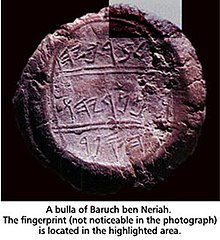Baruch
| Writing prophets of the Old Testament |
|---|
| Great prophets |
| Little prophets |
|
Names after the ÖVBE italics: Catholic Deuterocanon |
Baruch (abbreviated Bar ) refers to a Greek pseudepigraphy which Baruch, son of Neriah , was attributed to the scribe of the prophet Jeremiah . In the Septuagint this scripture comes directly after the book of Jeremiah. The Judaism they did not include in the Tanakh . The Roman Catholic Church and Orthodox Churches included it as a deuterocanonical script in their Old Testament (OT) and placed it behind the Lamentations of Jeremiah . In the Protestant churches it belongs to the apocrypha .
Namesake
Baruch, son of Nerija and quartermaster of King Zedekiah , was a historical person and is mentioned several times in the book of Jeremiah as the writer of this prophet ( Jer 32.12 EU ; 36.4–32 EU ; 43.1–6 EU ; 45.1f EU ). According to Jer 51,59-64 EU he was the brother of Seraja . Seals of a scribe Baruch were found during excavations in Jerusalem and published in 1996. The text of one of the seals reads: "Possession of Berekhyahu / son of Neriyahu / the scribe". A clay seal in a private English collection shows the name Baruch and a fingerprint. The seal of a Seraja (“possession of Seriahu / Neriyah”) was also found.
The finds do not show any authorship of this writer for the Book of Baruch or other pseudoepigraphies. The book has only survived in Greek and cannot have been written by the exiled scribe Jeremias, as it is much younger. The real author and the process of creation are unknown.
Transmission of the text
The book was probably composed of three or four parts in the 1st century BC and provided with a foreword and a few introductory sections. For bar 1.15–2.35 EU a Hebrew origin from pre-Macabean times is generally assumed, for the other parts - 3.9–4.4 EU around 200 BC, 4.5–5.9 EU from the 1st Century BC - some authors also represent a Greek origin. Various authors also suggest that the entire book was originally written in Hebrew.
The letter of Jeremiah is also only available in Greek and follows the lamentations in the Septuagint. In the Latin Vulgate , the letter of Jeremiah was added to the book of Baruch as the sixth chapter. However, it bears traces of translation and is therefore likely to have been written in Hebrew. An allusion in 2 Makk 2,1-3 EU and the palaeographic dating of a Greek fragment of the text in the Dead Sea Scrolls suggest that it originated in the 2nd century BC at the latest. An origin around 300 BC at the beginning of the Hellenistic era is likely.
Structure and content
The actual Book of Baruch begins with a historical introduction (1.1–14 EU ) in which it is initially stated (1.1–2 EU ) that the book was four years after the destruction of Jerusalem by the Chaldeans in Babel of Baruch (dem Secretary of the Prophet Jeremiah ), and then (1.3-14 EU ) that it was read at a meeting by ex-King Jehoiachin and other Jews in exile in Babylon. The congregation responded with weeping and prayer and had a rally and sent the collected money, book, and temple implements that had been abducted but that Baruch had received back to Jerusalem with a request for temple sacrifices and prayer.
The first section of the main body of the book (1.15-3.8 EU ) contains a double confession of the sins that led to exile (15-2.5 EU ; 2.6-13 EU ), along with a prayer for it that God may finally forgive his people (2.14-3.8 EU ):
“Lord Almighty God of Israel! A soul in fear, a spirit full of sorrow cries out to you. Hear, Lord, have mercy, since we have sinned against you. "
While the previous section has a lot in common with the Book of Daniel (cf. Dan 9.4–19 EU ), the next section (3.9–4.4 EU ) is similar to passages in the book of Job (cf. Job 28.1ff EU ) . It is a hymn of praise to divine wisdom that can only be found in the law given to Israel. Only in the form of the law has wisdom appeared on earth and is accessible to people:
“It is the book of God's commandments, the law that stands forever. All who hold on to it find life; but all who leave it succumb to death. Turn back, Jacob, take it! Go your way in the shine of its light! "
The last section covers EU 4.5-5.9 . It consists of four odes, all of which begin with the request “Have (t) trust” (4.5.21.27.30 EU ), and a psalm (4.36-5.9 EU ), which is very close to the eleventh of the apocryphal or pseudoepigraphic psalms of Solomon.
In Latin and Catholic German translations of the Bible, the letter of Jeremiah forms chapter 6 of the Book of Baruch.
Further pseudo-epigraphs
Subsequent to the Book of Baruch, the scribe Baruch was later credited with further writings:
- Syrian Baruch Apocalypse (also: 2. Baruch)
- Greek Baruch Apocalypse (also: 3rd Baruch)
- Paralipomena Jeremiae (also: 4. Baruch)
See also
literature
- Odil Hannes Steck: The apocryphal Baruch book . Vandenhoeck & Ruprecht, Göttingen 1993, ISBN 3-525-53842-1 .
- Biblical Archaeological Review . July / August 1991, pp. 27-30.
Web links
- The book in the standard translation
- A brief introduction
- The book Baruch bibelwissenschaft.de
Individual evidence
- ↑ Hershel Shanks: Fingerprint of Jeremiah's Scribe. Biblical Archeology Review, March / April 1996, pp. 36-38.
